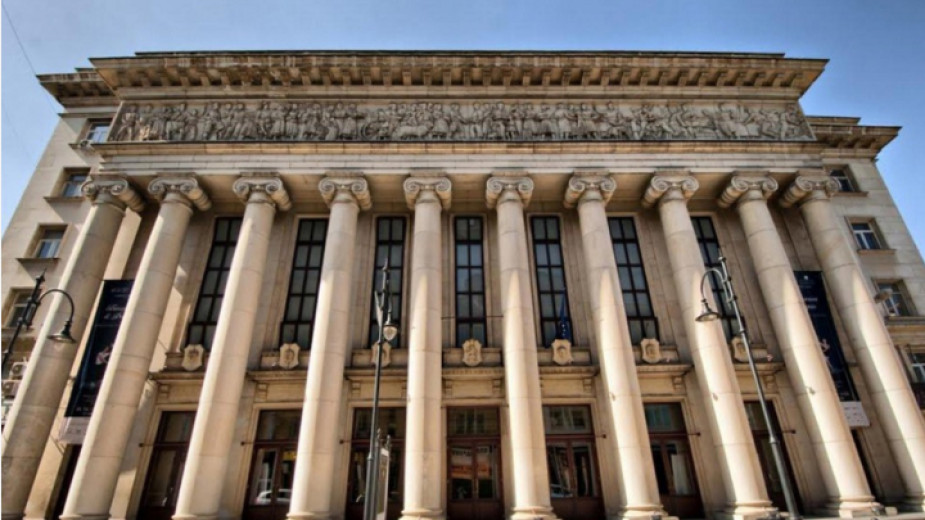 4
4
The beginning of the 1920s was a period when many Bulgarian architects and engineers returned to their homeland after studying abroad and worked for turning post-war Sofia into a true European city.

One of them was 30-year-old architect Lazar Parashkevanov, who had a degree in engineering and architecture from Prague and settled in Sofia in 1920. At that time, the country was ruled by the Bulgarian Agrarian National Union and the government was headed by his close friend Aleksandar Stamboliyski. A year later, Stamboliyski offered to architect Parashkevanov to create a project for a new building, which would house the headquarters of the party, but also have separate halls for organizing cultural events, exhibitions, and others. The military coup in Bulgaria and the murder of Stamboliyski in the summer of 1923 stopped the realization of the avant-garde project.

20 years later, Parashkevanov resumed work on the idea and in the spring of 1947 construction began. 18 months after the start, the authorities in Bulgaria decided that a small part of the building would remain for the agrarians, while the rest would be home to the National Opera. Amazed by the radical change, the architect ordered everything that was already built demolished and created a new project, once again impressive and innovative:
"The project went through a lot of changes," urbanist Zdravko Petrov says. “In the 1920s it reflected the architecture trends of the time, with many art-deco elements and elements of modernism. What we know today is the result of the second project and it is a building with a much more classical look. After the Second World War, there was a tendency towards Stalinist type of architecture in this country, which we can also see in the opera house."

Lili Goleminova, granddaughter of the great Bulgarian composer and conductor Academician Marin Goleminov, still remembers the stories of Lazar Parashkevanov, who was a frequent guest at her grandfather's home. She recalls his words that when you build an opera, the most important thing was to know about acoustics, because no matter how beautiful you make the building, if the hall inside is not suitable for performances, then you have failed.
"He himself used to say that he had to read piles of book about acoustics of opera halls in Czech, German and Russian, as well as to prepare and train a team of builders, with whom he worked together during the construction. Moreover, the budget was large at the beginning, but gradually savings started to be made before he was told that no materials would be ordered from abroad and he had to deal with what was available in Bulgaria. Parashkevanov began to get acquainted with the local materials. And so he created something amazing. The international team that came to check the acoustics of the opera hall, finished in 1953, ranked it among the halls with the best acoustics in all of Europe.”

Pianist of the National Opera, Valentin Stamov also confirms this:
"This is one of the most unique buildings in the world. The inner large hall has the shape of a musical instrument and looks a bit like a snail. There are double walls and floors, the ceiling has an opening like a wind instrument. On the balconies and lodges there are cavities that reflect the sound. The wooden paneling is also made of a material that is used in making musical instruments. The acoustical properties of our Sofia Opera place it among the best halls in the world," Stamov adds.

Compiled by: Vessela Krasteva /based on interviews with BNR-Radio Sofia/
English: Alexander Markov
Photos: operasofia.bg, BGNES, archiveA concert in Los Angeles with an all-Bulgarian programme dedicated to the National Day of March 3 will take place in the City of Angels in a few days, on March 21. This was announced by the famous film composer Penka Kuneva in an interview with Radio..
On March 17, the Sofia Philharmonic Orchestra and its principal conductor Nayden Todorov will once again perform at the legendary Wiener Musikverein Golden Hall in Vienna, Austria. Maestro Todorov will conduct Nino Rota's Concerto for Trombone and..
Irina Florin is one of the Bulgarian musicians with a strong sense of modernity in all its dimensions. The latest trends are reflected in her music, with which she continues to be impeccably present on the Bulgarian scene. "What I've always been..
A concert in Los Angeles with an all-Bulgarian programme dedicated to the National Day of March 3 will take place in the City of Angels in a few days, on..

+359 2 9336 661
